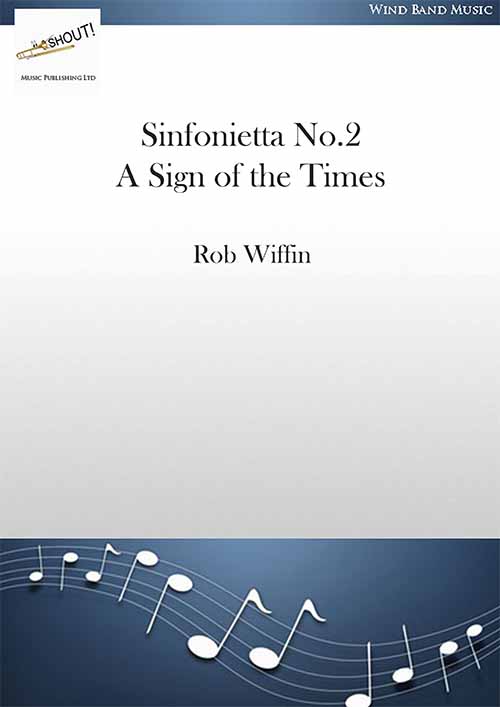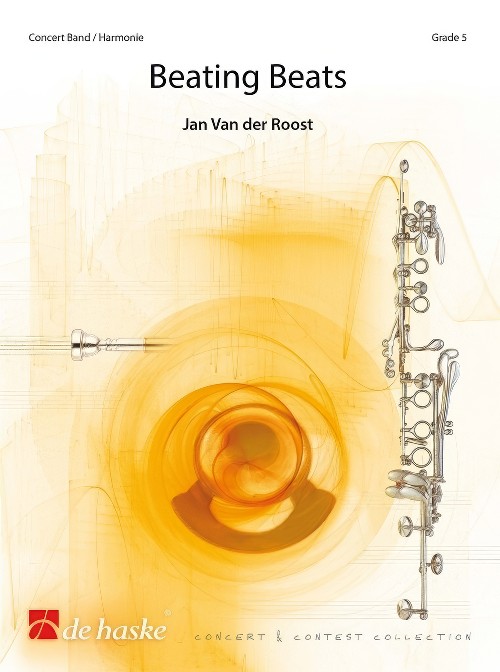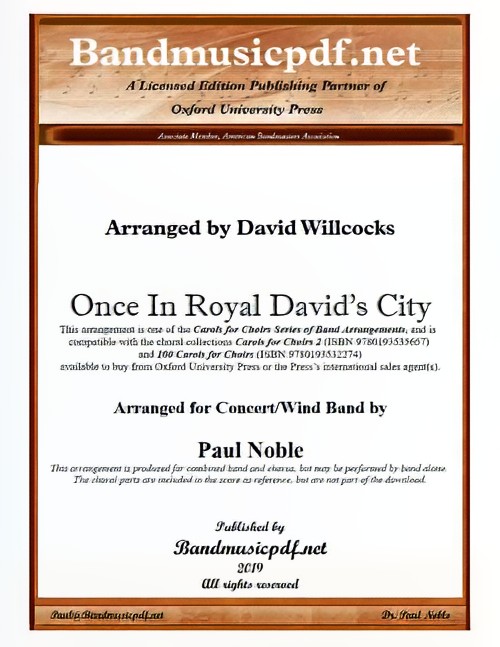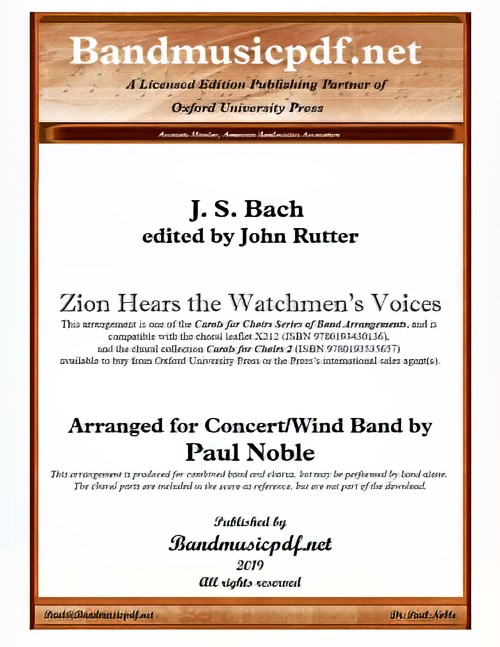Results
-
 £53.50
£53.50Four Pictures - Árpád Balázs
The teachers under whom rpd Balzs (b.1937) studied composition - Ferenc Farkas, Aram Khachaturian and Goffredo Petrassi - each independently formed the opinion that with his lyrical gift rpd Balzs's true creative field would be that of choral music and wind ensembles. Their early predictions are borne out by the roughly two hundred and fifty works for choir and almost twenty for wind orchestra that the composer has since produced. It is interesting that in the suite entitled Ngy kp (Four pictures) the stylistic features of these two related musical fields are united. In it the wind instruments sing! It was not by chance that the expansive second movement was given the title Cantilena, while the slightly livelier but just as lyrical third movement was entitled Arietta. The opening movement of the work is a stridently jolly, energetic Indul (March), but not one of the rigidly military kind: the 6/8 rhythm contributes to its light-hearted character. This music is avowedly akin to the ballet music of Prokofiev. This choice series of four character pieces is crowned by Jtk (Play) in which conveying the effect of the mixture of lines moving in parallel and then colliding with each other may be more technically demanding, but is well worth the effort! (Hungaroton HCD 31353)
Estimated dispatch 7-14 working days
-
 £94.99
£94.99Angels from the Realms of Glory
The title of this clever arrangement reveals the Christmas song it is based on. The melody can be traced back to a French folksong from the 18th century which is now known around the world. In France it is called Les anges dans nos campagnes, in Germany it is most widely known as Engel auf den Feldern singen and in England it was originally called Angels From the Realms of Glory but it often known as Angels We Have Heard on High. Everyone will rejoice upon hearing the 'Gloria in excelsis Deo' refrain!
Estimated dispatch 7-14 working days
-
£79.95
A Psalm of Praise - Score and Parts - James Curnow
Program NotesOriginally conceived as a brass band tone poem, A Psalm of Praise gained huge popularity when it was first published in 1980. When it first appeared in print, the work was widely performed by Salvation Army bands around the world. It is full of interest and presents plenty of what for many bands will be realistically achievable levels of musical and technical challenge.As with much Salvation Army music, it was inspired by words from scripture, specifically from Psalm 100. Musically, it is based on the well-known hymn tune Praise My Soul the King of Heaven, with motifs and fragments of the tune appearing throughout the work in various guises alongside the original thematic material.James Curnow's skillfully economic use of melodic and rhythmic ideas is demonstrated to perfection in this work, which will be rewarding to rehearse in detail and perform and will provide a useful addition to concert repertoire.
Estimated dispatch 7-14 working days
-
£15.95
A Psalm of Praise - Score only - James Curnow
Program NotesOriginally conceived as a brass band tone poem, A Psalm of Praise gained huge popularity when it was first published in 1980. When it first appeared in print, the work was widely performed by Salvation Army bands around the world. It is full of interest and presents plenty of what for many bands will be realistically achievable levels of musical and technical challenge.As with much Salvation Army music, it was inspired by words from scripture, specifically from Psalm 100. Musically, it is based on the well-known hymn tune Praise My Soul the King of Heaven, with motifs and fragments of the tune appearing throughout the work in various guises alongside the original thematic material.James Curnow's skillfully economic use of melodic and rhythmic ideas is demonstrated to perfection in this work, which will be rewarding to rehearse in detail and perform and will provide a useful addition to concert repertoire.
Estimated dispatch 7-14 working days
-
 £62.29
£62.29Caprice (Euphonium Solo with Concert Band) Andrew Batterham
VIEW SCORE PDF Caprice was written for Matthew van Emmerik, to showcase his virtuosity in an engaging piece of concert music. The work is in theme and variation form, with the primary material being the theme from the last of Paganini's Ventiquattro Capricci per violino solo, a collection of 24 caprices for solo violin. This theme has been the inspiration for similar works by many composers since it was first published, including Liszt, Brahms, Rachmaninov, Benny Goodman and Andrew Lloyd Webber. In this work, the famous theme is treated to a more contemporary approach. The first variation, Capricious, relies on motor rhythms and jagged dialogues between the soloist and the band. It is couched in an organic scale reminiscent of the Phrygian mode. The second variation, Sad, is in direct contrast, acting as a traditional ballad and allowing the soloist to explore the expressive side of the instrument. The third variation, Energetic, is a micro set of variations in itself, designed to display the soloist's innovative technique and stamina. Each section is more challenging than the last, until the work concludes with a whirlwind dance at breakneck speed. Like all of Batterham's recent work, the musical language of Caprice draws upon classical, jazz, funk and ska elements to create a unique sound where anything can happen, and probably will. This arrangement was made possible through Matt's instigation and generosity. To view a video of Matthew van Emmerik performing the version with brass band please visit www.youtube.com/watch?v=D0hsvux_a5o To view a video of Fletcher Mitchell performing the version with piano please visit www.youtube.com/watch?v=NOZ6KRldDVo Sheet music available from : UK: www.wind-band-music.co.uk USA: www.solidbrassmusic.com Instrumentation: Euphonium Soloist Piccolo Flute 1-2 Oboe Bassoon Clarinet in Eb Clarinet in Bb 1-3 Bass Clarinet in Bb Alto Saxophone 1-2 Tenor Saxophone Baritone Saxophone Trumpet in Bb 1-3 Horn in F 1-4 Trombone 1-2 Bass Trombone Euphonium Tuba String Bass Percussion 1-3
In stock: Estimated dispatch 1-3 days
-
 £71.00
£71.00"Our Own Red, White and Blue" - Henry Fillmore
This catchy little tune from march composer Henry Fillmore is one that you will be humming over and over again. Though one of his lesser known titles, it is unique for Fillmore marches as it is very playable compared to most of his barn burning marches and it does not contain the usual modulation or trio. This accessible march is sure to be a favorite for your band.
Estimated dispatch 12-14 working days
-
 £99.95
£99.95Sinfonietta No.2 - A Sign of the Times (Concert Band - Score and Parts) - Wiffin, Rob
It was an interesting challenge to return to the form of a sinfonietta some twenty years after the last one. This work is not hugely problematic to play but was written without regard for technical demands, following a series of compositions that needed to take difficulty level into consideration. The work has five percussion parts but the tuned percussion, although desirable, can be omitted. As for the band parts, Oboe 2 is largely covered elsewhere but the colour of the cor anglais would be a definite enhancement to the overall sound. The work was written in 2025 when it seemed as if the world was a particularly volatile place.The first movement 'Foment' seeks to capture that menacing mood of unrest and the potential for violence that seemed to erupt without warning and without efforts to contain it from warmongers posing as peacemakers. The music is severe and focussed with just a short scherzo-like episode of levity to balance the quasi-military mood.'A Dream of Peace' takes a few moments to contemplate a different, more peaceful world and several ideas are considered before settling on the slow waltz-like melody. This uses a very tonal language but is given a particular hue by its use of sevenths and ninths and there are moments of stress which disrupt the tranquillity.In 'Call to Arms' the warlike mood returns with a sense of restless energy that drives the music to its conclusion.- Rob WiffinDuration: 14.00
Estimated dispatch 7-14 working days
-
 £126.50
£126.50Beating Beats (Concert Band - Score and Parts) - Van der Roost, Jan
Beating Beats rhythmically is a rather special piece: more conventional metres are manipulated in such a way that the listener (without score) may be confused and even misled at various points! The 'regular four beat accents in a 4/4 measure for example are often not adhered to, giving the impression of a different metre altogether. However, at the same time it may be that some instruments do follow this "normal" 4/4 metre, thus confusing everyone - performers and listeners alike! On one hand, it is a "simple" piece with very playable and melodic themes, but their mysterious rhythmic makes it not only sound more complicated, but also makes for a greater challenge for both players and the conductor! As is mostly the case with Jan Van der Roost's works, the orchestration is both colourful and contrasting, with every section of the modern wind orchestra used equally. All in all, it's a work full of surprises with some unexpected harmonies and special melodic lines but above all, with metrical and rhythmical sure to catch you unawares! Duration: 7.00
Estimated dispatch 7-14 working days
-
 £75.00
£75.00Once in Royal David's City (Concert Band with Optional Choir - Score and Parts) - Noble & Willcocks
Once in Royal David's City is a Christmas carol originally written as a poem by Cecil Frances Alexander. The carol was first published in 1848 in her hymnbook Hymns for Little Children. A year later, the English organist Henry John Gauntlett discovered the poem and set it to music. According to The New Oxford Book of Carols, the text was conceived by Cecil Alexander after overhearing a group of her god children complaining about the dreariness of the catechism. Cecil masterfully took doctrines from the Apostle's Creed and simplified them for her hymns. Cecil wrote about 400 hymns in her lifetime, among which are All things bright and beautiful and There Is a Green Hill Far Away. She used the money for charitable purposes, and was a tireless advocate (and visitor) of the poor and sick. Henry John Gauntlett had spent the first half of his career as a lawyer before abandoning his practice to pursue music. He served as the organist at a number of leading London churches. Gauntlett was a prolific writer and is said to have composed over 1000 hymn tunes. He made tremendous contributions to the world of music, even inventing mechanical improvements to the organ. As a result, he was praised by the famous Felix Mendelssohn and was awarded an honorary doctorate in music from the Archbishop of Canterbury. In 1919, Arthur Henry Mann, organist at King's College (1876-1929), introduced an arrangement of Once in Royal David's City as the processional hymn for the service. In his version, the first stanza is sung unaccompanied by a boy chorister. The choir and then the congregation join in with the organ on succeeding stanzas. This has been the tradition ever since. It is a great honor to be the boy chosen to sing the opening solo--a voice heard literally around the world. In this arrangement for band accompaniment, the first five verses may be performed as directed by the conductor, with different groupings of instruments for each verse, i.e., Vs.1, A cappella; Vs. 2, Fl., Oboe, E.H., Bsns; Vs. 3 Cl., Saxes; Vs. 4, Brass; Vs. 5, All, and Vs. 6 as written with featured descant. This arrangement is one of the Series of Band Arrangements compatible with the David Willcocks Carols for Choir, Book 2 (#31).
Estimated dispatch 7-14 working days
-
 £75.00
£75.00Zion Hears the Watchmen's Voices (Concert Band with Optional Choir - Score and Parts) - Bach, Johann Sebastian - Noble & Rutter
Zion Hears the Watchmen Singing (Zion hrt die Wchter singen) is the fourth of seven movements of Bach's cantata Wachet auf, ruft uns die Stimme ('Awake, calls the voice to us'), BWV 140, also known as Sleepers Wake. It is regarded as one of his most mature and popular sacred cantatas. It is written in the style of a chorale prelude, with the phrases of the chorale, sung as a cantus firmus by the tenors (or by the tenor soloist), entering intermittently against a famously lyrical melody played in this arrangement in unison principally by the woodwinds. Bach composed the chorale cantata in Leipzig for the 27th Sunday after Trinity and first performed it on 25 November 1731. This arrangement represents one in the Series of Band Arrangements compatible with David Willcocks' Carols for Choirs.
Estimated dispatch 7-14 working days
